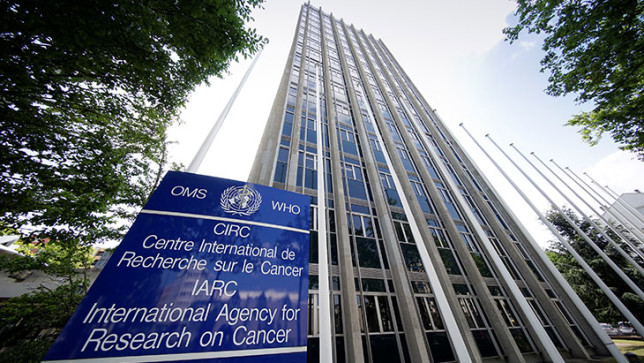In a Reuters article published on 19 October 2017, Kate Kelland reports on IARC Monograph draft documents “obtained by Monsanto as part of the legal proceedings in the United States”. Reuters states IARC “edited out “non-carcinogenic” findings” and “dismissed and edited findings from a draft of its review of the weedkiller glyphosate that were at odds with its final conclusion that the chemical probably causes cancer”, adding that the Agency “won’t say who made the changes or why”. The International Agency for Research on Cancer (IARC) rejected these false claims on Tuesday.

Source: www.iarc.fr
As IARC explained to Ms Kelland, changes made to draft documents are the result of deliberation between IARC Monograph Working Group members and therefore cannot be attributed to any particular scientist. It is usual procedure that drafts prepared before a Monograph meeting form the basis of open scientific debate during the eight-day meeting in Lyon and are revised as a result of those deliberations. The Working Group makes its own assessment of the available scientific literature and may conduct additional analyses of the data therein. The Working Group does not have to take account of prior national regulatory assessments in making its own, independent evaluation.
Ms Kelland refers to differences between the draft document she obtained and the published Monograph text. Most of these differences specifically relate to a review article[1] co-authored by a Monsanto scientist. The conclusions included in the draft Monograph document were those of the authors of this review article. During the meeting in Lyon, the Working Group considered that the review article did not provide adequate information for independent evaluation of the conclusions reached by the Monsanto scientist and other authors; consequently, the draft was revised, and the text in the published Monograph is the consensus opinion of the Working Group. However, the Monograph does factually describe the review article and the reported findings (see Monograph, pages 34–35 and 40–41).
The Reuters article is ambiguous as to precisely who is alleged to have “edited out “non-carcinogenic” findings”. IARC staff do not draft or revise the Monograph text. Only the Working Group writes and revises the text, as described in the Preamble to the IARC Monographs. The final Monograph evaluation represents the scientific consensus of the whole Working Group. Full details of the scientific report and the process for the classification of glyphosate are available online.
Deliberative drafts are not made public, in order to protect the Working Group from interference by vested interests. The position of IARC and the World Health Organization concerning the public release of deliberative documents, or records of deliberative scientific discussions, is consistent with standard practice in scientific committees. This was already clearly explained to Reuters after an earlier misleading report, in October 2016.[2] Observers, however, are permitted to attend the Monograph meetings and have access to all draft documents. Monsanto had an observer at the Monograph evaluation of glyphosate. This observer was quoted in the media as saying: “The meeting was held in accordance with IARC procedures. Dr. Kurt Straif, the director of the Monographs, has an intimate knowledge of the rules in force and insisted that they be respected.”[3]
Members of the Working Group expressed concern at being pressed to respond to allegations about the scientific debate that took place at IARC. In response, IARC was compelled to issue a reminder to all parties not to pressure or intimidate scientists in relation to their role as Working Group members. Reuters approached 16 members of the Working Group to ask them to justify their edits and deletions and claimed “none was willing or able to say who made the changes, or why or when they were made”. In an email seen by IARC, one Working Group member who did respond to Ms Kelland stated that all the procedures were transparent, with many witnesses to the discussions during the eight-day meeting, including various stakeholders.
IARC will not respond to baseless, defamatory statements about IARC or its Working Group, whether these are issued by Monsanto or other interested parties, directly or through third parties, including media contacts. IARC will not comment on the transparency of the evaluation processes of other agencies. IARC notes the context of ongoing legal proceedings and regulatory decision-making processes regarding glyphosate, but is not involved in these processes.
In summary, the cancer hazard classifications made by the IARC Monographs are the result of scientific deliberations of Working Groups of independent scientists, free from conflicts of interest. The resulting Monograph represents the Working Group’s consensus conclusions, based on their critical review of the published scientific literature, agreed upon by all Working Group members in plenary sessions. The principles, procedures, and scientific criteria that guide the evaluations are described in the Preamble to the IARC Monographs.
More information about the Monographs:
monographs.iarc.fr/ENG/News/Q&A_ENG.pdf
www.iarc.fr/en/media-centre/iarcnews/2016/glyphosate_IARC2016.php
Notes
1. Greim H, Saltmiras D, Mostert V, Strupp C (2015). Evaluation of carcinogenic potential of the herbicide glyphosate, drawing on tumor incidence data from fourteen chronic/carcinogenicity rodent studies. Crit Rev Toxicol. 45(3):185– 208. PMID:25716480
2. After the publication of a fallacious article on 14 June 2017, IARC issued a statement on its website stressing that IARC follows strict scientific procedure and systematically assembles and evaluates all relevant evidence available in the public domain for independent scientific review.
3. www.lemonde.fr/planete/article/2017/10/18/glyphosate-monsanto-tente-une-derniere-man-uvre-pour-sauver-le-roundup_5202606_3244.html


















